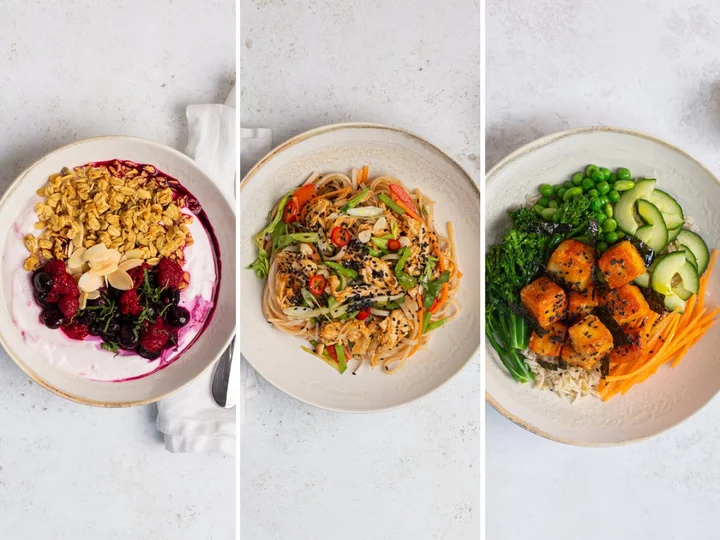
Everything Apple Plans to Show on Sept. 12: iPhone 15, Watches, AirPods
Apple Inc.’s most important new product unveiling of the year gets underway on Tuesday, when the company will
2023-09-08 19:51

Kanye West's wife forced to wear pillow in public after angering Italian locals
Kanye 'Ye' West and rumoured wife Bianca Censori have turned heads with risqué outfit choices while roaming Italy. Censori, who previously worked for West's Yeezy brand, was spotted covering her ensemble with a hotel pillow after furious locals hit back at the "offensive" choices in recent weeks. The shots show Censori in a sheer, nude bra and leggings with a purple pillow covering her chest. West sported an all-black outfit with no shoes. The photos shared to X/Twitter were soon met with confusion from fellow users, with one writing: "How completely ridiculous these people are. Put on some clothes and then you won’t have to take a hotel room cushion out sightseeing with you - and you even get your arms free! Novel concept." Another asked: "Why is Bianca walking around naked with a pillow?" Meanwhile, a third added: "Kanye & Bianca Censori are unhinged. Someone ought to stage an intervention. Wearing a pillow? Him walking in socks?" The pair have not been shy of controversy while travelling Italy after photos captured the rapper exposing his bare bottom at the back of a boat in Venice. The images prompted the boat company to issue a ban for life, adding they were "completely unaware" West had dropped his pants, as they were focusing on water traffic. A source for the Venice Police told the Daily Mail : "There are standards of public decorum that have to be followed by tourists and locals alike and any breaches are severely punished. The images of West with his trousers down while in a taxi as he and his partner crossed the lagoon were seen all over the globe." Sign up for our free Indy100 weekly newsletter Have your say in our news democracy. Click the upvote icon at the top of the page to help raise this article through the indy100 rankings.
2023-09-08 18:48

India or Bharat? A dinner invite sparks speculation as Modi's ministers push to rebrand the country
India, the host nation of this year’s Group of 20 summit, has two official names
2023-09-08 18:24

5 things everyone needs to know about eczema
It’s easy to dismiss eczema as just itchy dry skin. But as millions of people know, the effects of eczema go way beyond this. “Eczema is so much more than ‘just an itch’,” says Andrew Proctor, chief executive of the National Eczema Society. “Affecting over eight million people in the UK, this incurable, highly visible skin condition has a huge impact on every aspect of a person’s life, extending far beyond the physical symptoms of itchy, inflamed, sore, cracked and bleeding skin. “Living with eczema means constantly having to plan and prepare, as every decision you make will potentially affect your skin. It shapes your home environment, education, career, social life, hobbies, holidays and relationships, and as a result, patients often report feeling anxious, depressed, self-conscious, isolated and helpless.” This National Eczema Week (September 9-16), here’s what Proctor wants everyone to know… 1. It doesn’t just affect children Atopic eczema affects one in five children and one in 10 adults in the UK. Proctor says: “While eczema is often viewed as a childhood condition, it affects people of all ages. Some develop eczema as babies, others in childhood, but thankfully it can improve over time.” Some people will have eczema all their life however, and some only develop it in their later years. “The important thing is to seek medical advice as soon as possible to get control of the eczema and develop an effective skincare routine,” advises Proctor. 2. It’s not contagious Proctor says that sadly, many people still think you can catch eczema. “However, atopic eczema isn’t contagious,” he stresses – pointing out it’s a complex condition involving genes, the immune system, the environment and our skin barrier. “This means skin becomes very dry and doesn’t provide sufficient protection from irritants, allergens and infection.” To tackle this, a foundation of eczema care is to apply medical moisturisers (emollients) to trap water in the skin and help reinforce the skin barrier. “Finding the emollient that suits your skin best can involve a lot of trial and error, but it’s critical to managing eczema,” says Proctor. 3. Environment plays a huge role Environmental factors can trigger eczema flare-ups or make it worse. Common culprits include stress, being too hot/cold or experiencing a sudden change in temperature, soap, shampoo and bubble bath, laundry detergent and cleaning products, perfume, pollens and moulds, pet fur, wool and synthetic fabric, and house dust mites. “Everyone will have certain things that trigger their eczema, and these vary between people,” Proctor explains. “Try keeping a diary to help identify triggers and patterns, so you can remove likely suspects and see if it helps. Triggers can also change over time and it’s worth continuing with the diary even if you think you’ve identified yours.” 4. It’s hard not to scratch Proctor explains: “One of the most maddening things you can say to someone with eczema is ‘stop scratching’. It’s not that simple! The unbearable, relentless itch is one of the defining features of the condition, and patients refer to it as torture. “You know you shouldn’t scratch, as it damages the skin and can cause infections, but the relief it provides is irresistible.” To help manage the itch, Proctor suggests finding a positive distraction or asking others to help you take your mind off it. You could also try substituting another action for scratching – press a nail on the itchy patch or tap the skin gently with your forefinger; keep your hands occupied with a ball, toy or other object; or wrap a bag of frozen peas in a towel and apply it to the itchiest area. 5. It’s a mental as well as physical battle Living with eczema is mentally exhausting too. “It can be a rollercoaster of emotions, from excitement when you start a new treatment, to despair when it doesn’t work or you experience a bad flare-up,” says Proctor. “There can be huge frustration too, when you do everything you’ve been asked and the eczema still refuses to give you any respite.” If this happens, as well as asking your GP or dermatologist for a review, it’s important to reach out to family and friends for support: “People who are able to open up about how their eczema truly affects them can feel a huge weight has been lifted.” Other ways to help cope include good nutrition and hydration, regular exercise, rest and relaxation. “Journaling, meditation and mindfulness can help you focus on the good things in your life and counterbalance negative feelings about eczema,” adds Proctor. “When so much time and effort goes into managing your eczema, it’s easy to forget there’s more to you than just your skin. Think about what you want to accomplish and formulate a plan. It’s about living successfully alongside eczema, not having your life defined by it.” For more information, visit eczema.org. The NES’ new video – More Than ‘Just An Itch’ – goes live on September 9 to mark National Eczema Week. Read More How many times a week you need to workout to get fit Shaquille O’Neal says he lost 55 pounds after being unable to climb stairs How did man who dodged theme parks due to his weight lose nearly 60kg? What your dog’s ear movements say about their health, according to a vet Terminally ill mum prepares for worst after numb hand turns out to be deadly disease Man who went to Turkey to make himself taller says pain was ‘worth it’
2023-09-08 18:16

Food Prices Resume Decline Despite Lingering Supply Threats
Global food prices resumed declines to the lowest in more than two years amid ample supplies of cooking
2023-09-08 17:59

This is why you have weird dreams in the heatwave
Everyone has a theory about their dreams and the science or meaning behind them. And when the weather hots up, the more bizarre they tend to get. “Dreams are a fascinating and enigmatic phenomenon that occur during sleep, encompassing a vast realm of imaginative experiences,” says sleep expert and CEO of MattressNextDay, Martin Seeley. “They are a collection of thoughts, images, sensations, and emotions that unfold within the theatre of our minds.” Why do we dream? When we sleep, our brain enters a complex state where it engages in various cognitive processes, explains Seeley, including memory consolidation, problem-solving and emotional regulation. “Dreams are thought to emerge from these processes, weaving together fragments of memories, desires, fears, and subconscious thoughts into a narrative or non-linear sequence,” adds Seeley. “And they can be surreal, vivid, or mundane, blurring the boundaries between reality and fantasy.” While the precise purpose and meaning of dreams remains a subject of exploration and debate, Seeley says they can serve as a portal into the inner workings of our minds: “Providing a canvas for exploration, processing of emotions, and glimpses into the subconscious depths of our psyche.” Why do we dream more when it’s hot? Lisa Artis, deputy CEO of The Sleep Charity, says: “When the weather is hot, it can disrupt our sleeping patterns, making it difficult to fall asleep in the first place – and causes us to wake more often during the REM (rapid eye movement) sleep phase.” REM sleep is where we experience intense dreaming, explains Artis – so waking during or at the end of this cycle can mean we are more likely to remember our dreams. “Dreams happen regularly, but are often forgotten and our mind’s way of unpacking the day’s events, dealing with stress and sorting through our day-to-day thoughts,” notes Artis. Our body heat generally peaks in the afternoon then starts to drop over an evening to prepare us for sleep, says Artis. Melatonin, the sleep hormone, is produced when this happens.“An ideal temperature is around 16-18°C and anything around the 24°C mark can cause restlessness,” says Artis. “So, it’s no surprise that when we’re experiencing a heatwave with temperatures reaching over 30°C, it affects our sleep.”Can a heatwave really make dreams more surreal? The connection between heatwaves and the content or nature of dreams is not fully understood. However, there may be a few possible explanations if your dreams seem weirder when the weather heats up – although Seeley points out these are all speculative. First off, he agrees it may have a lot to do with the fact we’re less comfortable and waking more when it’s hot. “These frequent awakenings can interrupt the normal sleep cycle and result in a higher probability of remembering dreams, including the more unusual or vivid ones,” he notes. “So, during a heatwave, the increased frequency of waking up during the night might contribute to a greater recall of strange or funky dreams.” Secondly, the body’s physiological response to heat may influence brain activity, he adds: “Heat can affect neurotransmitter levels, such as serotonin and dopamine, which play a role in regulating mood and emotions. These alterations in neurotransmitter activity might impact the content and emotional tone of dreams, potentially leading to more surreal or bizarre experiences.” Psychological factors could also play a role. Heatwaves can cause restlessness and increased stress levels in some individuals. Seeley adds: “Stress and emotional fluctuations can manifest in dreams as strange or unusual scenarios, as the mind processes and attempts to make sense of these experiences.” Can we stop strange heatwave dreams happening? While it’s probably not possible to completely control the content of our dreams, there are certain strategies you can try to promote better sleep – and potentially reduce the likelihood of experiencing a restless night and unusual dreams during hot weather. Create a cool sleep environment: “Use fans, air conditioning, or open windows to circulate cool air in your bedroom – and consider using lightweight, breathable bedding materials,” says Seeley. Stay hydrated: “Drink enough water throughout the day to prevent dehydration, especially during hot weather,” he continues. “Being adequately hydrated can help maintain a balanced sleep cycle.” Practice relaxation techniques: “Engage in activities that promote relaxation before bed, such as deep breathing exercises, meditation, or taking a warm bath,” suggests Seeley. “These practices can help calm your mind and promote a more restful sleep.” Read More Charity boss speaks out over ‘traumatic’ encounter with royal aide Ukraine war’s heaviest fight rages in east - follow live All the times Kate has channelled the late Queen’s style since her death It’s not just dry skin: 5 things everyone needs to know about eczema YouTube begins verifying videos by UK doctors to tackle health misinformation
2023-09-08 17:49

Three healthy recipes to get back on track after summer
With September often thought of as a second January, it’s the perfect time to set goals and form new habits. Meal prepping is a great way to help you stay on track and reach your goals. Benefits include helping you to stick to healthier foods, saving money, minimising food waste, saving time and reducing stress. Sophie Dillon, head of nutrition at Fresh Fitness Food, has put together a few nutritious recipes (breakfast, lunch and dinner) that take less than 30 minutes to prepare and cook. Yoghurt and granola with berries Greek yoghurt is a great source of protein, and can also be beneficial for your gut, as it is a food-sourced probiotic (so long as it’s labelled to contain live cultures), and this homemade granola recipe is packed with slow-release carbs, providing a sustained energy release for your morning, and to help keep your blood sugar levels more stable. Tip: Batch-cook your granola and store in an airtight container for ease and an on-demand, nutritious addition to your yoghurts, smoothies, or if you just fancy a simple carby snack. Serves: 2 Time: 25 mins the first time, 5 mins once you have the granola on hand Ingredients: Handful of berries of your choice ½ cup ricotta cheese ½ cup Greek yoghurt ½ vanilla pod 1 scoop of vanilla whey For the granola: 50g buckwheat groats 100g oats 20g maple syrup 5ml olive oil ½ tsp ground ginger Method: 1. Blend the ricotta cheese till smooth and then mix in the Greek yoghurt, vanilla pod and whey protein. 2. Preheat the oven to 170C. 3. Place all ingredients for the granola into a bowl and thoroughly mix together. 4. Line a baking tray with some grease-proof paper, pour the granola mix onto the tray and pop in the oven for 10 minutes. 5. After 10 minutes, remove the tray and mix around the granola to break up any large clumps. 6. Place back into the oven for a further 10 minutes, then take out to cool. 7. Place the yoghurt in a bowl and top with granola and the berries of your choice. Bang bang chicken stir-fry Quick, easy meals are key when it comes to nailing your fitness goals, and this stir-fry is an easy lunchtime winner. We’d recommend cooking an extra couple of portions and popping them in the freezer for an easy dinner on busy days. Tip: If you end up with extra chicken, put it to the side to have in a bang-bang chicken salad. Serves: 2 Time: 15 mins Ingredients: 2 chicken breasts, cut into strips ½ juice of a lime 1 tbsp peanut butter ½ tsp tamari sauce ½ tbsp sriracha ½ carrot, julienne or grated ½ red pepper, sliced 1 spring onion, sliced 1 tbsp oil of choice (we recommend sesame for a nice, nutty flavour) 3 nests rice noodles ½ tbsp sesame seeds (optional) ½ red chilli, sliced and de-seeded (optional) Method: 1. Mix together the sriracha, lime, salt, lime, peanut butter and tamari thoroughly with a whisk. 2. Mix all ingredients together so the chicken is well coated 3. Heat the sesame oil in a wok. Once hot, add the chicken to the pan, and cook until golden. 4. While the chicken is cooking, cook your noodles per the instructions on the packet, and leave to stand for one minute before adding to your pan. 5. At the same time, add your carrots and red pepper and stir until everything is coated in the sauce/oil mixture. 6. Once the chicken is cooked and the veg is soft, mix in your spring onions, and plate up. 7. Garnish with sesame seeds and chilli, if desired. Crispy tofu poke bowl Tofu is a great source of plant-based protein, containing all the essential amino acids your body needs. It’s also rich in vitamins and minerals, including calcium, iron and vitamin A. The great thing about crispy tofu, aside from its nutritional benefits, is that it works just as well in leftovers, too. Throw it in a tofu satay curry, pad thai or into a salad for a plant-based protein boost. Serves: 2 Time: 30 mins Ingredients: 1 block of firm tofu 1 tbsp olive oil ½ tsp smoked paprika 1 tsp cornflour ½ carrot 100g cucumber 50g edamame 50g peas 150g uncooked rice 100g tenderstem broccoli 1 tbsp sesame seeds (optional) 1 nori sheet, sliced into strips (optional) Salt to taste Method: 1. Drain the tofu and cut into equal-sized pieces. 2. Mix the tofu with cornflour, salt, olive oil, smoked paprika, and tofu together. 3. Roast on lined trays at 190C until brown and crispy – around 20 mins. Drain once cooked. 4. While the tofu is cooking, cook your rice as per the instructions. 5. In the meantime, prepare your veg. Chop and de-seed your cucumber. 6. Steam your tenderstem, peas and edamame. 7. Once your tofu is crispy and your rice is cooked and drained, plate everything up, and garnish with the nori and sesame seeds. Read More Is bottomless prosecco going to be killed off by climate change? Budget Bites: Three ways to pimp up university student classics Epicurus: American fast food meets the Middle East in Camden Market ‘How being thrifty in the kitchen helped me get on the housing ladder’ How to make spinach and mushroom quiche For a quick sugar fix, try this Biscoff microwave mug cake
2023-09-08 16:59

YouTube begins verifying videos by UK doctors to tackle health misinformation
YouTube has launched a verification system for UK-based doctors, nurses, and other healthcare professionals to help Britons dodge medical misinformation online. UK-based users accounted for more than two billion video views of clips on health conditions in 2021. YouTube added a new seal of approval to accounts run by licensed doctors, nurses, psychologists, and other health practitioners or organisations who have passed stringent verification checks to fight misinformation. YouTube head of UK health Dr Vishaal Virani said the move to verified health videos for UK users was crucial due to the number of Brits accessing healthcare information through the video-sharing platform. Dr Virani told the BBC: “Whether we like it or not, whether we want it or not, whether the health industry is pushing for it or not, people are accessing health information online. We all know how difficult it can be to differentiate between healthcare information from trusted and reliable sources and content which is inaccurate or doubtful provenance Professor Dame Helen Stokes-Lampard “We need to do as good a job as possible to bring rigour to the content that they are subsequently consuming when they do start their care journey online.” The verification system began accepting applications from UK-based healthcare professionals to those with an active medical licence in June. Accounts that applied to the verification scheme are now starting to receive their YouTube mark of authenticity on their videos, to make it as easy as possible users to know if the information has come from a qualified healthcare professional. Potential health creators submitting their accounts have to go through a rigorous, multi-stepped verification process that works in partnership with the Academy of Medical Royal Colleges and the NHS. Health creators also have their past videos scrutinised and do not receive verification if previous videos uploaded to YouTube have contained any medical misinformation. Chairwoman of the Academy of Medical Royal Colleges Professor Dame Helen Stokes-Lampard said the partnership with YouTube had resulted in a positive solution for all. Dame Helen said in a statement: “We all know how difficult it can be to differentiate between healthcare information from trusted and reliable sources and content which is inaccurate or doubtful provenance. “I am pleased to say we have been able to draw on our own expertise and that of organisations from across the UK healthcare landscape to produce an easy-to-apply set of principles which will ultimately benefit everyone who turns to YouTube seeking trustworthy health information.” YouTuber and doctor Simi Adedeji has already received her YouTube tick of approval. But Dr Adedeji told the BBC that her videos, which primarily focus on skin health and women’s health, are not to be used in lieu of making an appointment with a medical professional for real-life advice. Dr Adedeji said: “There’s a difference between giving medical education, which is what we’re doing, and giving medical advice, which we don’t do. “It’s about giving medical information so that the audience feels empowered and can then go and see their doctor.” Read More Charity boss speaks out over ‘traumatic’ encounter with royal aide Ukraine war’s heaviest fight rages in east - follow live Should you swap your foundation for a lightweight skin tint? What should you do if you think your child is being bullied at school? What women should do if they experience violence online
2023-09-08 16:25

It’s not just dry skin: 5 things everyone needs to know about eczema
It’s easy to dismiss eczema as just itchy dry skin. But as millions of people know, the effects of eczema go way beyond this. “Eczema is so much more than ‘just an itch’,” says Andrew Proctor, chief executive of the National Eczema Society. “Affecting over eight million people in the UK, this incurable, highly visible skin condition has a huge impact on every aspect of a person’s life, extending far beyond the physical symptoms of itchy, inflamed, sore, cracked and bleeding skin. “Living with eczema means constantly having to plan and prepare, as every decision you make will potentially affect your skin. It shapes your home environment, education, career, social life, hobbies, holidays and relationships, and as a result, patients often report feeling anxious, depressed, self-conscious, isolated and helpless.” This National Eczema Week (September 9-16), here’s what Proctor wants everyone to know… 1. It doesn’t just affect children Atopic eczema affects one in five children and one in 10 adults in the UK. Proctor says: “While eczema is often viewed as a childhood condition, it affects people of all ages. Some develop eczema as babies, others in childhood, but thankfully it can improve over time.” Some people will have eczema all their life however, and some only develop it in their later years. “The important thing is to seek medical advice as soon as possible to get control of the eczema and develop an effective skincare routine,” advises Proctor. 2. It’s not contagious Proctor says that sadly, many people still think you can catch eczema. “However, atopic eczema isn’t contagious,” he stresses – pointing out it’s a complex condition involving genes, the immune system, the environment and our skin barrier. “This means skin becomes very dry and doesn’t provide sufficient protection from irritants, allergens and infection.” To tackle this, a foundation of eczema care is to apply medical moisturisers (emollients) to trap water in the skin and help reinforce the skin barrier. “Finding the emollient that suits your skin best can involve a lot of trial and error, but it’s critical to managing eczema,” says Proctor. 3. Environment plays a huge role Environmental factors can trigger eczema flare-ups or make it worse. Common culprits include stress, being too hot/cold or experiencing a sudden change in temperature, soap, shampoo and bubble bath, laundry detergent and cleaning products, perfume, pollens and moulds, pet fur, wool and synthetic fabric, and house dust mites. “Everyone will have certain things that trigger their eczema, and these vary between people,” Proctor explains. “Try keeping a diary to help identify triggers and patterns, so you can remove likely suspects and see if it helps. Triggers can also change over time and it’s worth continuing with the diary even if you think you’ve identified yours.” 4. It’s hard not to scratch Proctor explains: “One of the most maddening things you can say to someone with eczema is ‘stop scratching’. It’s not that simple! The unbearable, relentless itch is one of the defining features of the condition, and patients refer to it as torture. “You know you shouldn’t scratch, as it damages the skin and can cause infections, but the relief it provides is irresistible.” To help manage the itch, Proctor suggests finding a positive distraction or asking others to help you take your mind off it. You could also try substituting another action for scratching – press a nail on the itchy patch or tap the skin gently with your forefinger; keep your hands occupied with a ball, toy or other object; or wrap a bag of frozen peas in a towel and apply it to the itchiest area. 5. It’s a mental as well as physical battle Living with eczema is mentally exhausting too. “It can be a rollercoaster of emotions, from excitement when you start a new treatment, to despair when it doesn’t work or you experience a bad flare-up,” says Proctor. “There can be huge frustration too, when you do everything you’ve been asked and the eczema still refuses to give you any respite.” If this happens, as well as asking your GP or dermatologist for a review, it’s important to reach out to family and friends for support: “People who are able to open up about how their eczema truly affects them can feel a huge weight has been lifted.” Other ways to help cope include good nutrition and hydration, regular exercise, rest and relaxation. “Journaling, meditation and mindfulness can help you focus on the good things in your life and counterbalance negative feelings about eczema,” adds Proctor. “When so much time and effort goes into managing your eczema, it’s easy to forget there’s more to you than just your skin. Think about what you want to accomplish and formulate a plan. It’s about living successfully alongside eczema, not having your life defined by it.” For more information, visit eczema.org. The NES’ new video – More Than ‘Just An Itch’ – goes live on September 9 to mark National Eczema Week. Read More Charity boss speaks out over ‘traumatic’ encounter with royal aide Ukraine war’s heaviest fight rages in east - follow live YouTube begins verifying videos by UK doctors to tackle health misinformation Should you swap your foundation for a lightweight skin tint? What should you do if you think your child is being bullied at school?
2023-09-08 16:20

Should you swap your foundation for a lightweight skin tint?
If you’re looking to streamline your morning beauty routine and create a beautiful your-skin-but-better base, a skin tint might be the answer to your prayers. Part of the new wave of hybrid make-up heroes, these lightweight complexion perfectors are similar to BB creams or tinted moisturisers, but come with added skincare benefits. “A skin tint is aimed at evening skin tone and adding hydration rather than helping to hide imperfections,” says Samantha Kendrew, head of education for Mii Cosmetics. Unlike full-coverage foundation, skin tints are “usually of a much lighter consistency, feel almost weightless when applied to the skin and give sheer coverage”. Make-up with benefits Infused with hydrating ingredients, these fluid formulas glide on easily and some contain sunscreen – depending on your skin type, you might not even need moisturiser underneath. “A skin tint is a great choice if you’re looking for a lighter product to give you a dewy glow,” says Kendrew. “They are also buildable, so you can create a fuller coverage if you choose to.” Thanks to a flood of new launches, skin tints are blowing up on TikTok, with beauty influencers raving about their glow-giving effects. “The ‘no make-up make-up’ trend is hugely popular and a skin tint is a good way to achieve this look,” Kendrew explains. They are part of the “trend towards enhanced versions of our natural skin as they are so sheer – it gives a barely-there hint of colour so your skin can look its healthiest”. Dab and blend The best way to apply a skin tint is using your fingers and after completing your usual skincare routine – just make sure to wash your hands first. “Apply a small amount of product onto your fingertips – remember you can go in with more and build the coverage as needed,” Kendrew advises. “Dab the product in small dots on your forehead, cheeks and chin, and blend in circular motions. It’s always worth waiting a few minutes before getting dressed to allow the skin tint to dry completely.” For a super-quick everyday make-up look, simply add mascara and lip balm, or go glam with a few extra steps. “You can use concealer with a skin tint to help hide any blemishes or imperfections,” Kendrew says. “You can also use a brightening concealer under the eyes if you need a little more coverage here to disguise dark circles.” Add definition to your cheekbones with bronzer or a pop of colour with a warm-toned blusher. “You want to work with textures that enhance each other,” Kendrew recommends. “Cream blushers and bronzers are great as they help to enhance that dewy finish rather than a powder formula which can be mattifying.” Here are five of the best new skin tints to try now… Sculpted by Aimee HydraTint Moisturising Tinted Serum, £23 Formulated with moisture-giving ceramides and hyaluronic acid plus soothing centella asiatica water, this serum delivers silky, sheer coverage. Mii Skin Secret Cream Tint SPF25, £24 Combining high-factor sunscreen with encapsulated pigments, this vitamin E and white tea extract-infused tint blends out to create a glowy, radiant finish, and comes in four versatile shades. Hourglass Veil Hydrating Skin Tint, £49 With hyaluronic acid and squalane (big hitters in the hydration stakes), this non-comedogenic (meaning it won’t block pores) and vegan skin tint comes in 18 shades. Delilah Wake Up Radiant Skin Tint, £39 Ideal if you want to add some warmth to your complexion, this tint comes in four shades (opal, amber, bronze and solar) for dewy, sun-kissed skin all year round. Ciaté Dewy Skin Tint, £29 A cult favourite that’s back after a hiatus, this ultra-dewy formula is what you need to get the coveted ‘glass skin’ glow. Available in 10 shades, it contains vitamin C and hyaluronic acid plus antioxidant-rich yuzu and dragon fruit extracts. Read More Charity boss speaks out over ‘traumatic’ encounter with royal aide Ukraine war’s heaviest fight rages in east - follow live What should you do if you think your child is being bullied at school? What women should do if they experience violence online Athlete who ran over 200km through the desert shares advice for running in a heatwave
2023-09-08 15:51

Pinault to Buy Majority Stake in Talent Agent CAA
French billionaire Francois Pinault’s holding company Artémis agreed to buy a majority stake in the Hollywood talent giant
2023-09-08 15:26

What should you do if you think your child is being bullied at school?
As well as being exciting, the start of a new school year can be very scary for some kids – as the toxic dynamic between bullies and the children they target could resume. The prospect of a new year of bullying, or the first experience of being a target for school bullies, can blight the lives of pupils and become something that terrifies both them and their parents, who are often unaware of the persecution of their child. Indeed, new research by the anti-bullying charity The Diana Award for its #BacktoBullying campaign has revealed 65% of children are scared of going back to school, with a third saying the thought of returning to school makes them want to cry. And it’s not just the kids who are scared – the study found half of parents dread sending their children back to school due to bullying. “When the new school year starts it can be an exciting and sometimes unsettling time for children,” points out Martha Evans, director of the Anti-Bullying Alliance (ABA). “There will be new pupils, new class groupings and, for some, new schools. It can be a worrying time and we’re often told friendships and bullying are high on the list of worries. “Parents should be aware of the signs that their child might be on the receiving end of bullying behaviour, and know how to respond.” Evans says research suggests being bullied can have serious implications for a child’s life chances, with the effects often lasting into adulthood. That’s why anti-bullying training and programmes for schools, including Anti-Bullying Week (November 13-17), are so vital for schools to help tackle the problem. Evans says it’s useful for parents who are concerned about bullying to understand exactly what bullying is, as “it’s not just ‘falling out’ or ‘banter’”. The ABA defines bullying as: “The repetitive, intentional hurting of one person or group by another person or group, where the relationship involves an imbalance of power. Bullying can be physical, verbal or psychological. It can happen face-to-face or online.” What are the signs of bullying? Children might not want to talk about what’s going on, but Evans says warning signs of bullying may include… Coming home with torn clothes or missing belongings. “This could show your child is being picked on physically,” says Evans. Unexpectedly not wanting to go to school. Evans points out that while most bullying starts face-to-face at school, it often then goes online, too. Complaining of unexplained illnesses or headaches. “The stress of bullying can create physical symptoms, or the child may make up illnesses to avoid being bullied at school,” warns Evans. Becoming quiet and withdrawn. Evans says worrying about hurtful behaviour can cause deep anxiety, and children may look upset when they use their electronic devices. “Online bullying is particularly hurtful,” explains Evans, “as it follows a child even after they’ve left the school gates and can continue 24/7.” Children who are being bullied may want to leave for school much earlier than necessary or come home late, says Evans. “Avoiding other children arriving or leaving school is a sure sign something is wrong,” she points out. What should you do if your child is being bullied? Stay calm Evans says it’s important to keep your cool, even though you’re probably feeling angry and upset that your child is being targeted. “You should focus on gently speaking to your child and listening carefully,” she explains. “Your job is to reassure them that it can be sorted out.” Get the facts Talk calmly to your child and establish what’s happened and who did what, and when. Evans advises parents and children to keep a diary of when the bullying happens, and explains: “It will be useful to see the pattern of bullying over time and to share with the school, if and when you speak to them.” Tell them not to retaliate Evans says parents shouldn’t encourage their child to retaliate to bullying, especially through violence, as it can have negative and unpredictable results. “They may be hurt even further, or be seen by those in authority as the problem,” she warns, and suggests instead that parents tell them to walk away and get help. Be aware of mental stress Don’t underestimate the effect bullying can have on a child’s mental health and keep an eye out for warning signs. “Bullying can have a considerable impact on a child’s mental health,” warns Evans, “so if your child is showing signs of serious distress, such as depression, anxiety and self-harm, always see a GP.” Find out what your child wants Parents should ask their child what they want to happen next, advises Evans, and help them to identify their choices, the potential next steps to take, and the skills they have to help stop the bullying. Speak to the school Ask to see the school’s anti-bullying policy, so both you and your child know the process for getting things sorted out, advises Evans. Don’t let them blame themselves Sometimes children can think they’re to blame in some way for being bullied, but Evans stresses: “Make it clear that bullying is never acceptable and if a child or young person is being bullied then it’s others who are to blame, not them.” Read More Charity boss speaks out over ‘traumatic’ encounter with royal aide Ukraine war’s heaviest fight rages in east - follow live What women should do if they experience violence online Athlete who ran over 200km through the desert shares advice for running in a heatwave Women being invited to help shape the future of reproductive healthcare – from period pain to menopause
2023-09-08 14:57
